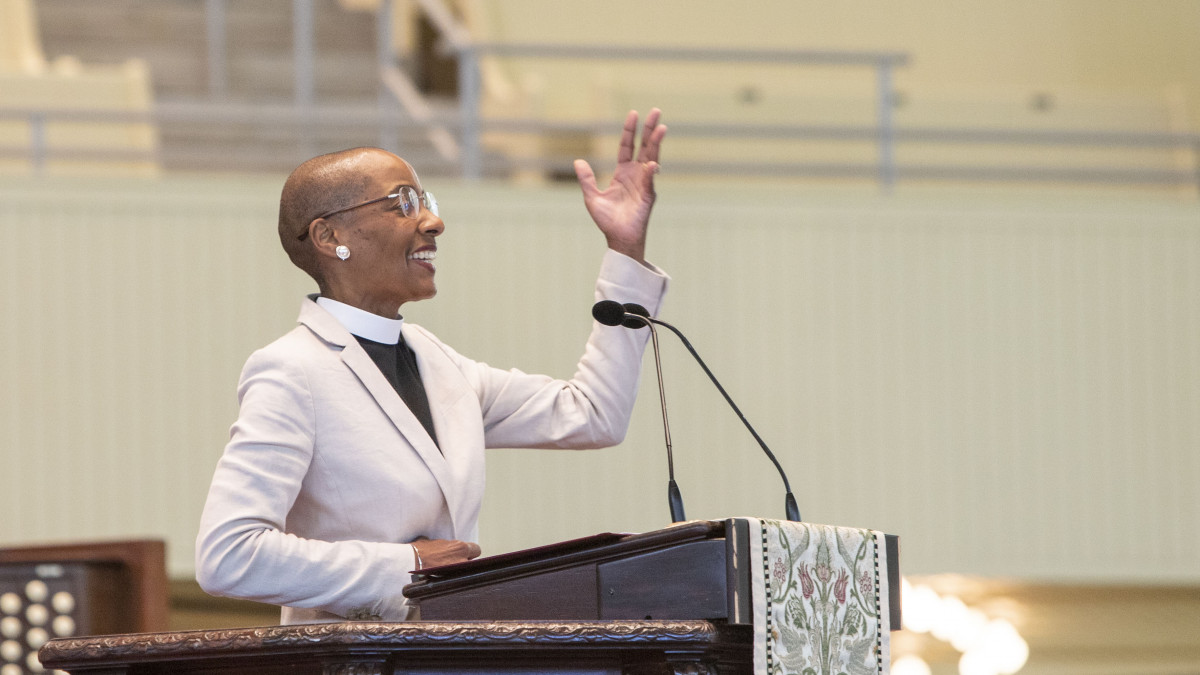Column by Welling Hall
The V. Rev Kelly Brown Douglas expounded on the text of John 8:1-11 at the 9:15 a.m. Monday morning worship service in the Amphitheater. She told of the National Negro Convention that opened in Buffalo, New York, 60 miles from Chautauqua, on Aug. 15, 1843. Fifty delegates from a dozen states, including Frederick Douglass, Henry Garnet and Samuel H. Davis, gathered to talk about how to gain the freedom of African Americans, both those who were enslaved and those who were nominally free.
Douglas cited famous addresses by Garnet and Davis.
Garnet said that “slavery hurls defiance at the face of God” and urged enslaved persons to resist by any means necessary.
In Davis’ opening remarks, he welcomed delegates “lately from that part of our country, where they see our brethren, bound in manacles, suffering and bleeding, under the hand of the tyrant, who hold in one hand the Constitution of the United States, which guarantees freedom and equal rights to every citizen, and in the other the scourge dripping with human gore, draw from the veins of his fellow man.”
We have yet to decide, Douglas said, if we will follow the Constitution or be a nation that is still defined by slavery. Recalling the work of W.E.B. Du Bois and his essay on the warring souls of African Americans, she asked, “What does it mean to be a people of soul in a nation that is defined by a warring soul?”
To answer this question, Douglas turned to the morning’s Scripture, John 8:1-11, the story of the woman caught in adultery. In response to the Pharisees, Jesus said, “Let him who is without sin cast the first stone.”
Those gathered put down their stones and walked away.
Douglas told us that Bryan Stevenson, author of Just Mercy: A Story of Justice and Redemption, says that to be people of soul in a nation with a warring soul, we must, like Jesus, be stone catchers. It is not enough to not cast stones of hate, bigotry, intolerance or microaggression. We are to be stone catchers.
Douglas provided the congregation with ways to be stone catchers. The first way, according to Douglas, is to show up. Where were all the white folk who protested George Floyd’s murder when, in June 2022, Jayland Walker was shot by police more than 40 times for a traffic violation? Their absence was noticed. White folk need to show up in homes, town meetings, board meetings. White folk need to show up for a world free from the legacy of slavery and with all of its “-isms.” White folk need to protest the murder of people who are stoned to death today because of who they are.
The second way is to speak up. Why did it take the murder of George Floyd for white people to speak up? Douglas cited Martin Luther King Jr., saying that “the ultimate tragedy is not the oppression and cruelty by the bad people, but the silence over that by the good people.” White supremacy is etched into the soul of the nation. Douglas told the congregation that they could not stay anesthetized behind their stained glass security, feeling safe in their vacation communities, while the world itself is not safe.
“In a nation with a warring soul,” Douglas said, “passivity is not acceptable.”
Douglas remembered Congressman John Lewis, who said that when you see injustice, you must say something or do something. In other words, be a stone catcher.
Third, Douglas said, white folk need to stand with those who suffer injustice. She told the story of a Black man who felt more and more uncomfortable in his gentrified neighborhood. He was afraid that, like other Black men, he would be murdered for walking around his own neighborhood. His neighbors walked with him. This is what it means to stand in solidarity with those at whom society casts stones.
Douglas said that Jesus was a stone catcher for the woman allegedly caught in adultery. His entire ministry was about stone catching. Jesus caught stones for Samaritans, for the blind, for the lame, for any group targeted by hatred, prejudice, bigotry and fear.
Jesus did not hide behind his male privilege, his Jewish privilege, his Divine privilege, any of which might have protected him at various times. Rather, Jesus used his privilege to catch stones being thrown at others.
We must do the same, Douglas said. The privileges that protect us should propel us to protect those whose lives are in danger beyond these gates. Those who gathered at the 1843 National Negro Convention 60 miles from Chautauqua put their own lives at risk to stand with their enslaved siblings. Now, in a nation with a warring soul, we must refuse to be anything less than stone catchers. This is what it means to be people with soul.
The Rev. Natalie Hanson, interim senior pastor of Chautauqua Institution, served as liturgist. Nicholas Stigall played the prelude, “How Great the Bliss to be a Sheep of Jesus,” by Margaret Sandresky. Retired educator and African American Heritage House volunteer, Elaine Davis, read the Scripture. The anthem, sung by the Chautauqua Motet, was “Ubi Caritas,” by Zachary Wadsworth. Joshua Stafford, director of sacred music and Jared Jacobsen Chair for the Organist, played Antonio Soler’s Fanfare from the Sixth Double Concerto as the Postlude. Support for this week’s chaplaincy and preaching of the V. Rev. Kelly Brown Douglas is provided by the Gladys R. Brasted and Adair Brasted Gould Memorial Chaplaincy.





